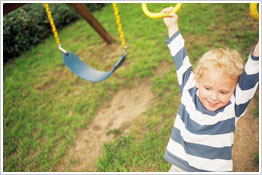The Playground Good Samaritan
By Marjorie Foerster Eddington and Jeremy Gilman, college student
Good Samaritans make a difference in people's lives: they help others who are in need. We have the opportunity to help our young siblings, nieces, nephews, and friends become Good Samaritans. Of course the first thing to do is to set a good example by being a kind and helpful individual. Another thing we can do is explain how they can be good helpers in their own lives. And we can share this story, which Jeremy Gilman adapted from Jesus' parable, with our dear young friends.
MFE
 Not many children have experience with robbers and travelling on roads, but every first grader knows about the playground. It is a place to have fun, but is also a place where things can go wrong -- like when the older kids take your space, or when you do something embarrassing. So I wrote a story based on this playground and what it would be like for a first grader living the Good Samaritan story. Not many children have experience with robbers and travelling on roads, but every first grader knows about the playground. It is a place to have fun, but is also a place where things can go wrong -- like when the older kids take your space, or when you do something embarrassing. So I wrote a story based on this playground and what it would be like for a first grader living the Good Samaritan story.
Once upon a time on the first graders' playground, there was a kid named Pismo who had a very tasty looking bag of skittles. He was going to play on the swings when he stepped into the shadow of a huge "thing." Well, this "thing" just happened to be a big, bad sixth grader. After seeing the skittles in Pismo's hand, the sixth grader decided that he was hungry and grabbed the skittles from little Pismo. Of course, Pismo was upset about this, but when he tried to ask the sixth grader for his skittles back, the sixth grader just laughed, punched Pismo in the face, and walked away.
Now Pismo was crying: he had been beaten up, and he had no skittles -- his very favorite candy. As he sat there crying, the coolest first grader walked by and looked down at Pismo crumpled on the ground. But the first grader walked right by, thinking that he was too cool to help Pismo because Pismo was not the most popular kid in his grade. Then, the prettiest girl in school walked by and looked down at poor, sad Pismo. She was about to help him up, but she then remembered that he had cooties and that touching him would make her have cooties, too. So, she continued on her way.
Finally, the most unpopular little first grader walked by and saw Pismo sitting there, looking miserable. He remembered the time that Pismo had laughed at him because he hadn't dressed up for Halloween. But this little first grader decided to lend a hand to Pismo anyway. He helped Pismo up, cleaned him up, and even gave Pismo his own bag of skittles so that Pismo could enjoy them.
Now, this made Pismo very happy, but he was confused as to why the most unpopular first grader had helped him out when Pismo had laughed at him. When Pismo asked the unpopular first grader about this, he replied simply, "I helped you out because you needed my help. Even though you did laugh at me, you still needed my help."
After Pismo thought about this for a little bit, he finally understood. It wasn't about being popular or having cooties. It was about helping those people who needed his help. He decided to live the rest of his life like that and be a good helper.
Most people know what it's like to grow up on the playground. But young children might not understand all Jesus' references to priests, Levites, rabbis, and Samaritans (and why it was so amazing that it was a Samaritan, and not a Hebrew, who stopped and helped the man). But everyone knows about the popular kids and remembers what it was like in first grade when girls had cooties and how hard it was to think that someone you had laughed at would actually help you out. But these are important points to learn early in life (especially learning to help others) because they will stay with you and enrich your own and other's lives. |

